

The Djavad Mowafaghian Centre for Brain Health is located on the traditional, ancestral and unceded territory of the Musqueam people.



The Djavad Mowafaghian Centre for Brain Health is located on the traditional, ancestral and unceded territory of the Musqueam people.

In 2024, we proudly celebrate ten years of excellence in research, education and clinical care since the official opening of the Djavad Mowafaghian Centre for Brain Health. As we reflect on a decade of success, we are amazed at the profound impact the Centre has had on the advancement of brain health throughout BC, across the country and beyond.
From its inception, one of the key goals was to unite research and clinical care. Over the past decade, the Centre has become the heart of neuroscience research and patient care in BC. It is now comprised of over 150 foundational and clinical scientists, seven clinics and a thriving Brain Wellness Program which provides lifestyle and exercise programs to over 2,000 people across the province.
The Centre is truly a hub where clinical and basic science coalesce, fostering creativity and synergy. Our five integrated research programs (IRPs) have brought together clinicians and discovery scientists, creating opportunities for collaboration, training and team science. This has been further strengthened by initiatives such as our Kickstart Grants, which have sparked new interdisciplinary research projects.
In the past year alone, Centre members have secured over $70 million in research funding and produced over 1,000 published papers, including 163 collaborative studies within UBC and 915 in collaboration with national and international partners. Our clinics also conducted over 20,000 patient visits and established new guidelines for treatments in mental health and neurological disorders.
The Centre’s core facilities have also been integral in accelerating research, providing scientists, clinicians and trainees with access to state-of-the-art equipment and technologies. The Charles E. Fipke Integrated Neuroimaging Suite (FINS) recently underwent significant equipment upgrades to the MRI and PET/MRI scanners, allowing for a new realm of research questions with a broader multi-modality approach. The NeuroImaging and NeuroComputation Core (NINC) provides advanced microscopy and imaging systems, with continued support for big data analysis and a variety of open science initiatives. In addition, the Borgland Family


Brain Tissue and DNA Bank remains a key resource for the collection, storage and distribution of biospecimens for clinical studies, while the Preclinical Discovery Centre provides ongoing animal care facilities.
The Centre has also fostered a supportive learning environment, creating opportunities for thousands of trainees over the past decade. Together, the Undergraduate and Graduate Programs in Neuroscience provide students with a comprehensive education through enriching research experiences in both laboratory and clinical settings.
Looking ahead, one of our future goals is to create a new School of Neuroscience, which would allow us to attract the best and brightest students and provide a world-class, multidisciplinary educational experience for the next generation of scientists. This new school would be only the second School of Neuroscience in Canada and would propel UBC to become a global leader in the field of neuroscience.
We are immensely proud of the Centre’s accomplishments over the past ten years. The Centre has not only established itself as a trailblazer in neuroscience research but has also made significant contributions to brain health knowledge and patient care. We are excited for the future as we begin our new term as co-directors of the Centre and look forward to another decade of promoting brain health through innovative research, training and care in BC and across Canada.

Dr. Lynn Raymond Co-Director

Dr. Shernaz Bamji Co-Director
Snapshot of 2023-2024
$70.9 million in research funding
1,117 publications
7 clinics: 20,540 clinic visits and 1,000+ new referrals
1 11 C anada Research Chairs
Canada Excellence Research Chair
639 international, 295 national and 168 institutional collaborations in publications
159 members:
137 full members, 22 associate members spanning UBC, Simon Fraser University, University of Victoria, University of Northern BC and University of Toronto
13
don or-funded research chairs & professorships
200+ trainees: including 48 M Sc, 79 PhD and 100+ postdoctoral fellows
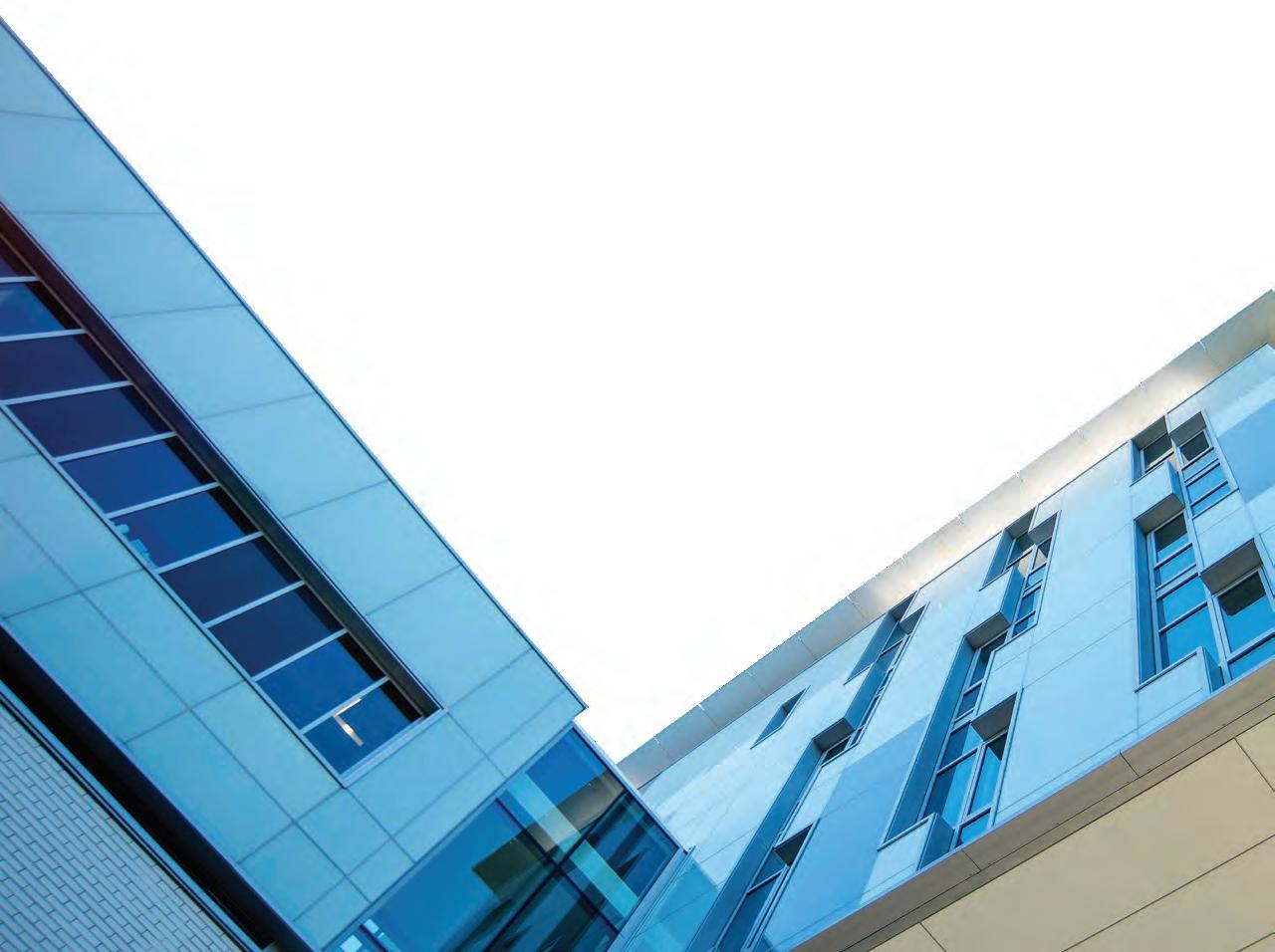
100+ media mentions
Our faculty, staff and trainees making headlines on social media

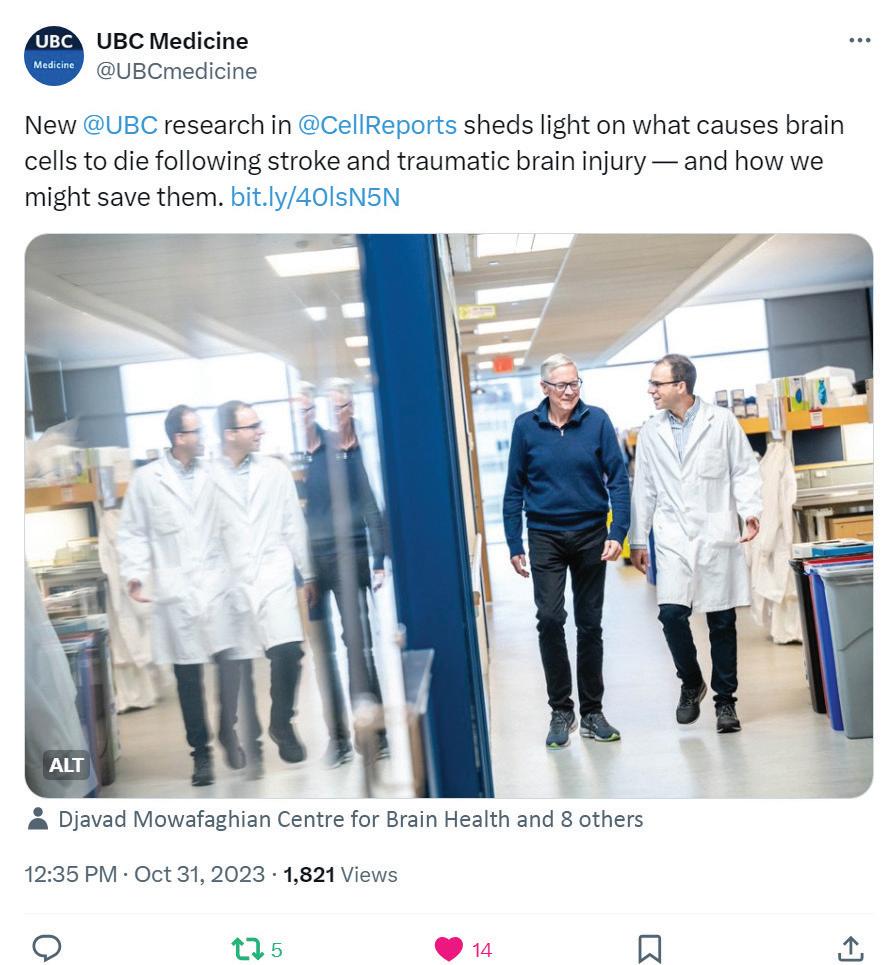

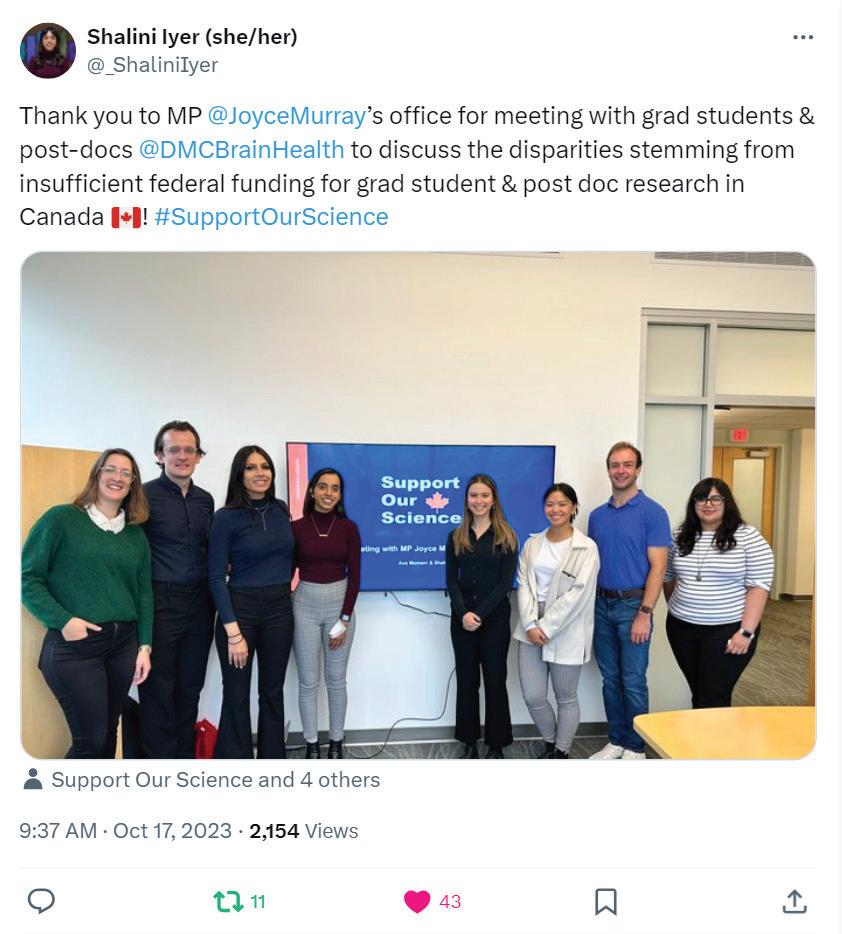
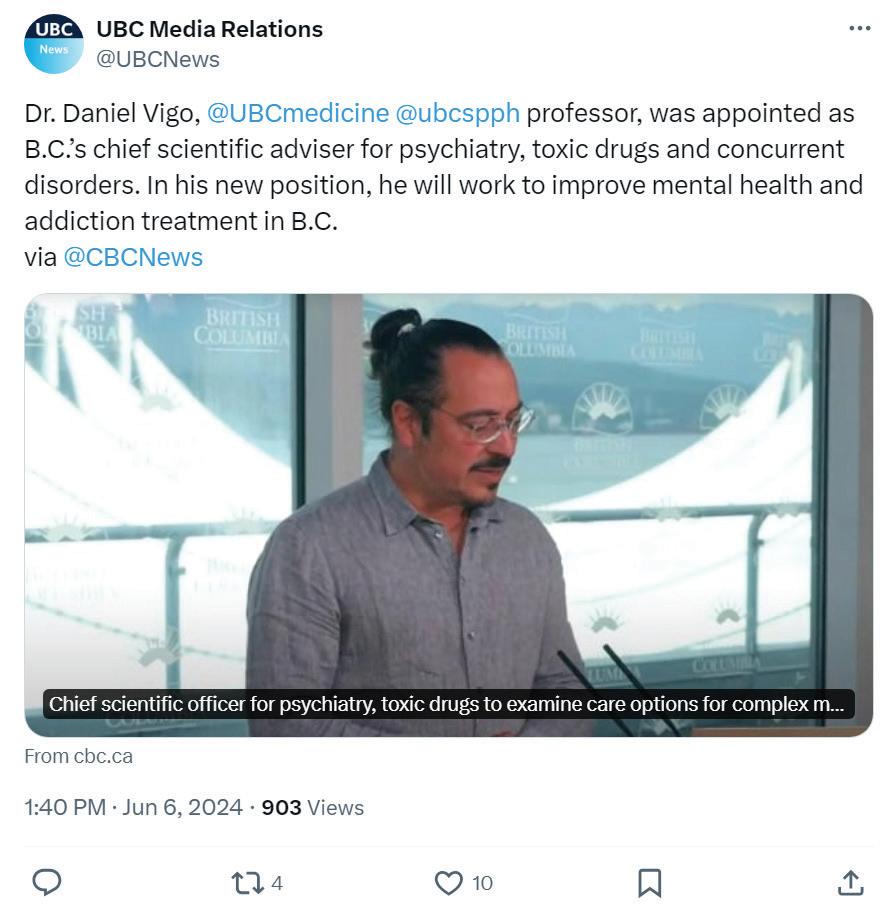
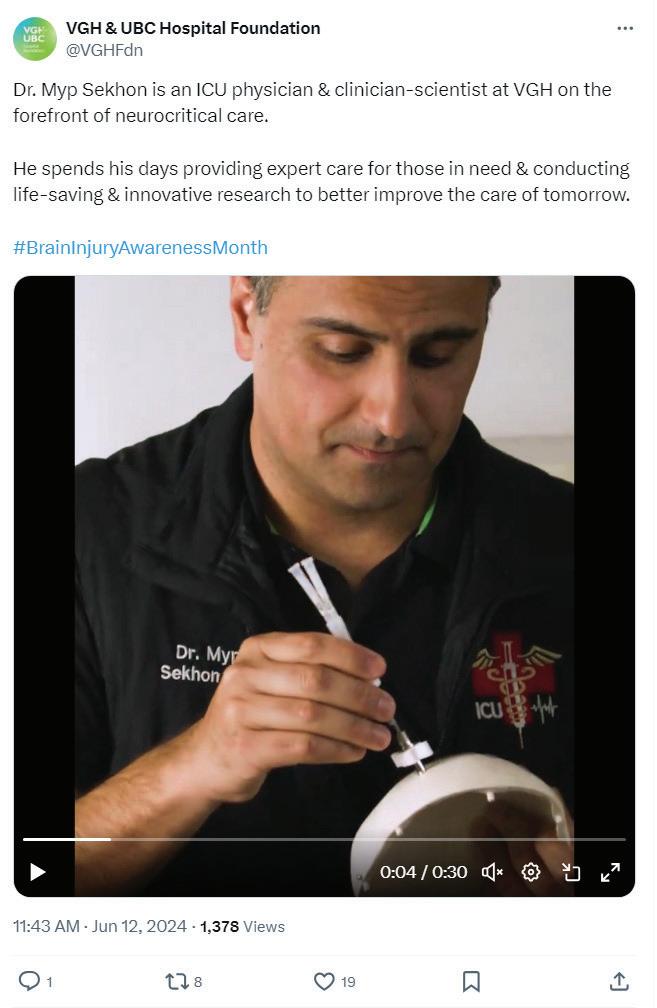
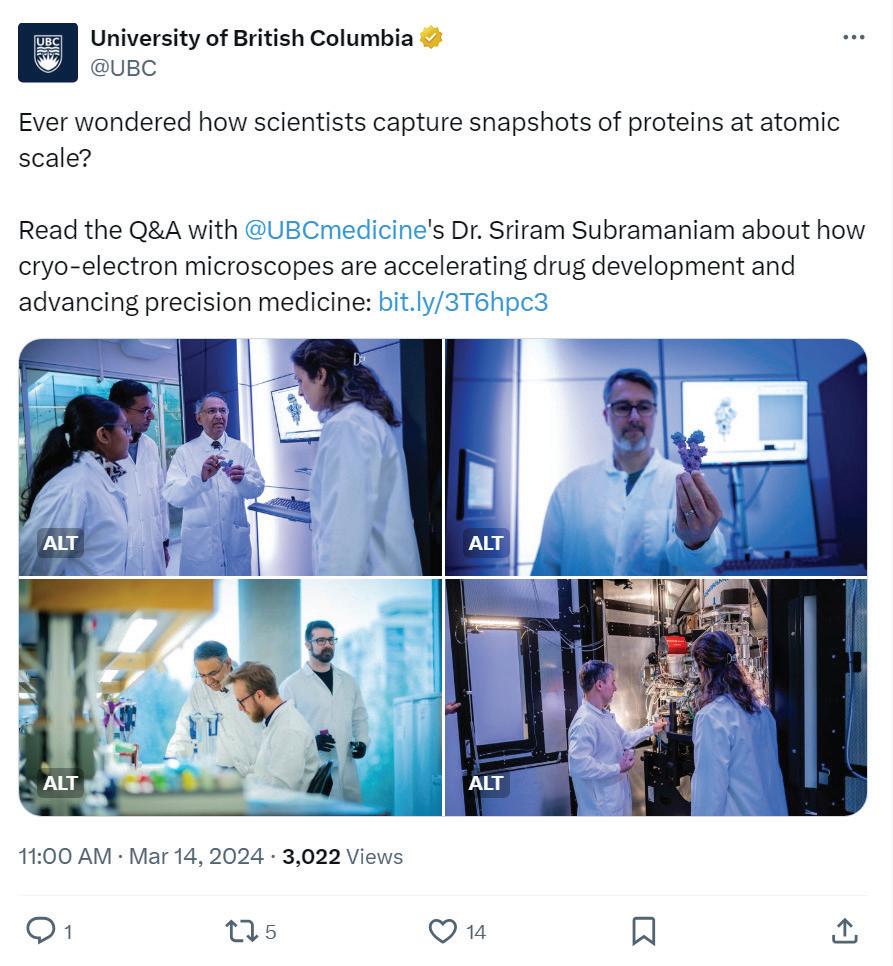


February 2014
The Djavad Mowafaghian Centre for Brain Health officially opens.
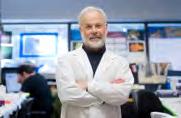
A groundbreaking study led by Dr. Neil Cashman uncovers how Amyotrophic Lateral Sclerosis (ALS) spreads from cell to cell, opening up exciting possibilities for developing treatments that could potentially block the progression of this disease.
January 2015
NeuroImaging and NeuroComputation Core (NINC) is established, providing advanced microscopy and imaging systems as well as support for big data analysis, which are key to accelerating pre-clinical research.
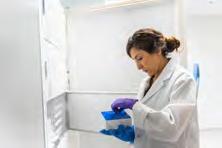
April 2015
Borgland Family Brain Tissue and DNA Bank is established as a centralized resource for the collection, storage and distribution of biospecimens that will help advance clinical research studies at the Centre.

August 2015
Dr. Blair Leavitt and his team develop a revolutionary new test that allows physicians to measure the effects of gene silencing therapy in Huntington disease, which will support the first human clinical trial of a drug that targets the genetic cause of the disease.
February 2018
Dr. Teresa Liu-Ambrose and her team find that aerobic training boosts brain function in older adults with mild vascular cognitive impairment (a condition caused by reduced blood flow to the brain), improving decision-making and problem-solving skills.
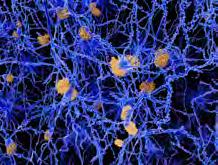
January 2016
Dr. Robin Hsiung and researchers in the Clinic for Alzheimer Disease and Related Disorders demonstrate that build-up of cerebral amyloid, a protein marker of Alzheimer disease, is more common in those with injury to deeper structures of the brain.

June 2016
Drs. Anthony Traboulsee, Weihong Song and Carles Vilarino-Guell prove that multiple sclerosis (MS) can be caused by a single genetic mutation—a rare alteration in DNA that makes it very likely a person will develop the more devastating form of the disease.
July 2018
Dr. Helen Tremlett discovers evidence of the MS prodrome, which refers to early symptoms that occur before classical onset of the disease, offering hope for earlier intervention, treatment and care.

April 2018
A study led by Dr. Fidel VilaRodriguez finds that a newer form of repetitive transcranial magnetic stimulation (rTMS) called intermittent theta burst stimulation (iTBS) which only takes three minutes, is just as effective as standard rTMS for people with treatment-resistant depression.

February 2019
The Charles E. Fipke Integrated Neuroimaging Suite opens, housing Canada’s first PET/ MRI machine dedicated solely to brain-related research and a first-of-its-kind Philips Elition 3T MRI.
February 2017
In a breakthrough study, Dr. Shernaz Bamji’s lab genetically engineered mice to resist the lure of cocaine, providing evidence that genetics and biochemistry play a bigger role in drug addiction than poor decision-making, which could potentially pave the way for better treatments.
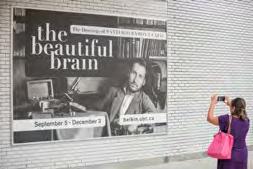
September 2017
The Centre collaborates with UBC’s Morris and Helen Belkin Art Gallery to present the first North American exhibition of “The Beautiful Brain: The Drawings of Santiago Ramón y Cajal.”
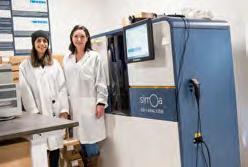
June 2019
Using the Simoa HD-1 Analyzer, the first tool of its kind in Canada, Dr. Cheryl Wellington and her team have identified blood biomarkers to help diagnose and treat traumatic brain injury in children, positioning the Centre’s researchers at the forefront of biomarker research and discovery.
October 2019
BC Brain Wellness Program is created by Drs. Silke AppelCresswell and Jack Taunton , offering evidence-informed lifestyle and wellness programs for individuals living with chronic brain conditions, their care partners and healthy agers.

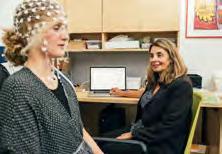
January 2020
Research led by Dr. Naznin Virji-Babul is the first to show how information is rerouted in the brain following concussion in adolescents, offering new potential for improving concussion diagnosis and treatment.
April 2021
Dr. Tim Murphy and his team develop a 3D synthetic animated mouse to train computer models to analyze animal behaviour, which can significantly improve efficiency and accuracy in behavioural research studies.

April 2022
Using 3D bioprinting technology, Drs. Haakon Nygaard and Brian MacVicar are working to grow tissue models of patients’ own brains, which allows for exploration of the fundamental mechanisms at work in the progression of Alzheimer disease.
September 2022
UBC Undergraduate Program in Neuroscience officially welcomes its first cohort of students.
December 2022
A $33.8 million gift is donated to UBC and VGH & UBC Hospital Foundation (the largest known donation ever for MS research worldwide) and will be used to establish the BC MS Cell Therapies Translational Research Network
2020 2021 2022

April 2020
Dr. Terry Snutch leads the Canadian COVID-19 Genomics Network – Virus Sequencing Initiative (CanCOGeN-VirusSeq), a nationwide effort to sequence 150,000 COVID-19 patient samples to provide key data on virus transmission trends and changes in the virus.

July 2021
Dr. Shannon Kolind receives one of the first Hyperfine portable MRI systems in Canada to investigate possible uses in research and clinical settings.
December 2021
Using cryo-electron microscopy, Dr. Sriram Subramaniam and his team are the first to describe the structure of the original COVID-19 Omicron variant, helping to refine the development of nextgeneration vaccines.
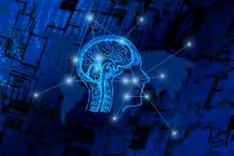
May 2023
The Djavad Mowafaghian Centre for Brain Health officially becomes an Open Science Institute
August 2023
Treatment with modern antidepressants may help prevent patients with bipolar disorder from relapsing into a depressive episode, according to an international clinical trial led by Dr. Lakshmi Yatham
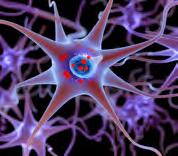
February 2024
Dr. Jon Stoessl and a team of international researchers propose a new biological classification system that can define and identify molecular biomarkers of Parkinson disease before motor symptoms appear, which will help in the development of precisionbased therapies.
2024
June 2024
ALS and Related Disorders Clinic opens, joining six other clinics housed at the Centre, all of which provide comprehensive patient care for people living with various neurodegenerative disorders.
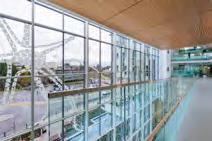


Dr. Cheryl Wellington and her team have received $3.4 million to lead a project improving brain injury diagnosis in survivors of intimate partner violence (IPV) and exploring links to Alzheimer disease. Despite high rates of brain injuries in IPV survivors, effective diagnostic methods are lacking, leaving many without essential care. This project aims to identify protein biomarkers in the blood that correlate with brain injury in IPV survivors, which could enhance diagnosis and treatment.
The research involves collecting blood samples from survivors across various healthcare facilities in British Columbia, including Embrace Clinic at Surrey Memorial Hospital. The project, funded by the United States Department of Defense, is a collaborative effort with Dr. Paul van Donkelaar from UBC Okanagan, Vancouver Island University, Fraser Health and Supporting Survivors of Abuse and Brain Injury through Research (SOAR), emphasizing community engagement and participatory research. This work could significantly improve health outcomes for IPV survivors, especially women, by increasing awareness and facilitating earlier interventions and treatment protocols. “
Intimate partner violence is a public health crisis, affecting one third of women globally and 44 per cent of women in Canada. With our research, we hope to increase awareness of the prevalence and severity of brain injury in survivors of IPV, and to improve diagnosis and care overall.”
Dr. Wellington

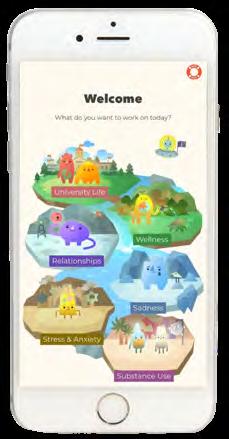
University life, often seen as a time of excitement, can also bring significant challenges, leading to mental health struggles. Many students in Canada face barriers to accessing mental health care, including issues of availability, accessibility and acceptability. To address these challenges, a student e-mental health project led by Dr. Daniel Vigo’s lab at UBC created the Minder app, a digital tool designed to support student wellbeing. Funded by Health Canada, Minder is free for all Canadian students and was co-developed with input from hundreds of students, ensuring it meets their needs.
Minder offers personalized mental health interventions through an automated chatbot, peer support and tailored recommendations. It connects students to appropriate campus groups, addressing issues like anxiety, depression and substance use. A study involving 1,496 UBC students found that Minder was effective in decreasing depression, anxiety, binge drinking, cannabis use and improving wellbeing.
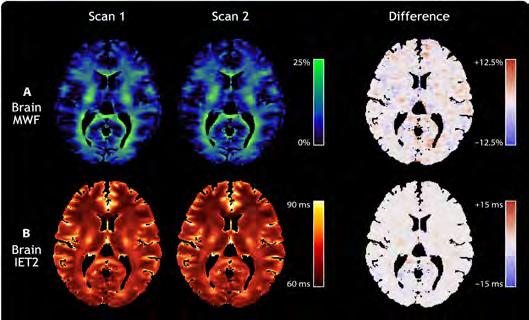

“
We tried
to create a tool that would expand the range of services available to everyone’s issues related to the lived experiences of a student.”
Dr. Vigo

Looking ahead, Dr. Vigo’s lab plans to integrate artificial intelligence (AI) into Minder to enhance personalization and responsiveness. While acknowledging the potential benefits of AI, Dr. Vigo also warns of the risks of untested technologies. He emphasizes the importance of community, urging students and faculty to foster a supportive environment where individuals feel empowered to seek help and offer assistance to those in need.
Under the supervision of Dr. Shannon Kolind, recent PhD graduate Dr. Adam Dvorak developed a groundbreaking MRI technique called the Constrained, Adaptive, Low-dimensional, Intrinsically Precise Reconstruction (CALIPR) framework, which significantly speeds up myelin imaging, a crucial process for diagnosing neurological disorders. Traditionally myelin imaging is very slow, requiring the MRI scanner to collect huge amounts of data. However, CALIPR allows for high-quality myelin measurements by collecting only a tiny fraction of the data, reducing scan time from 3 hours to just 7.5 minutes—about 25 times faster than a conventional MRI scan.

Dr. Dvorak examined the use of the CALIPR framework specifically in the context of myelin water imaging (MWI), a non-invasive technique used in quantitative MRI to measure the amount of myelin, which is the insulating layer that protects neurons, in the human body. CALIPR’s precision in quantifying myelin content in both the brain and spinal cord surpasses existing techniques, offering improved detection of demyelinating diseases like multiple sclerosis.
CALIPR is compatible with various MRI machines, including portable scanners, and could revolutionize quantitative MRI techniques, enhancing the treatment and care of numerous neurological disorders by providing faster, more accurate imaging.
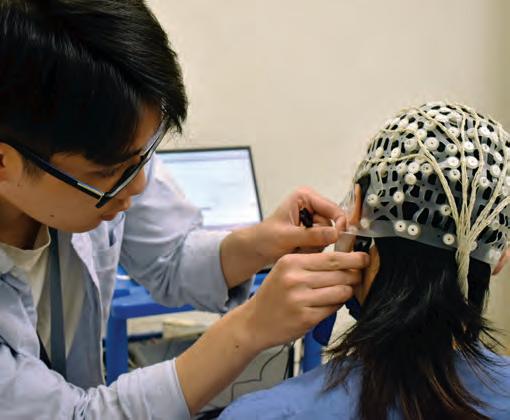

We think this technology will be a game-changer. This will allow people with Parkinson’s to stay independent in their homes for as long as possible.”
Dr. McKeown
Parkinson disease is a progressive neurological disorder characterized by motor impairments like slowness of movement, muscle stiffness, tremors and loss of balance. Despite numerous pharmaceutical efforts, there is no cure or medication to halt disease progression. Dr. Martin McKeown’s team at the Pacific Parkinson’s Research Centre and the Djavad Mowafaghian Centre for Brain Health is developing innovative technologies to enhance patient care and treatment.
The Precision Stimulation study explores galvanic vestibular stimulation (GVS), a non-invasive technique that sends small electrical currents to the vestibular system, which controls balance. By customizing GVS parameters for each individual using electroencephalogram (EEG) and functional magnetic resonance imaging (fMRI) data, the team aims to improve both motor and non-motor symptoms of Parkinson’s more effectively than standard treatments.
The CAMERA (Confidential Automatic Monitoring, Examination, and Recognition of disease Activity) study is developing a smart camera system for in-home use to monitor Parkinson’s symptoms like body movement and mood without wearable sensors. This AI-driven system, built in collaboration with Parkinson’s patients and caregivers, aims to help individuals manage their disease while maintaining privacy and independence.
Despite people of Asian ancestry comprising over 16 per cent of Canada’s population, they are underrepresented in Alzheimer disease research, accounting for less than three per cent of participants in clinical trials and national data sets. To address this gap, Dr. Robin Hsiung is leading the Vancouver site for the Asian Cohort for Alzheimer Disease (ACAD) project, the first major genomics study focusing on Alzheimer’s in Asian Canadians and Americans. Partnering with 16 academic medical centres across Canada and the United States, the project aims to uncover lifestyle and genetic risk factors specific to Asians.

Dr. Hsiung highlights the importance of addressing racial inequities in Alzheimer’s research to improve care for Asian Canadians. Alzheimer’s risk factors and progression may differ by race, but most research to date has focused on Caucasians. Early evidence shows that many diseases, including Alzheimer’s, present differently across racial groups, underscoring the need for diverse data. ACAD is recruiting adults aged 60 and older of Chinese, Korean and Vietnamese ancestry to build a comprehensive dataset. The project aims to develop better diagnostic tools and treatments tailored to Asians, improving prevention and care strategies.
Our goal is to develop blood biomarker benchmarks and polygenic risk score models to measure the risk for Alzheimer disease in the Asian community.”
Dr. Hsiung
“Our goal is for every person living with ALS in BC, who is eligible, to have the opportunity to participate in clinical trials.”
Dr. Pioro

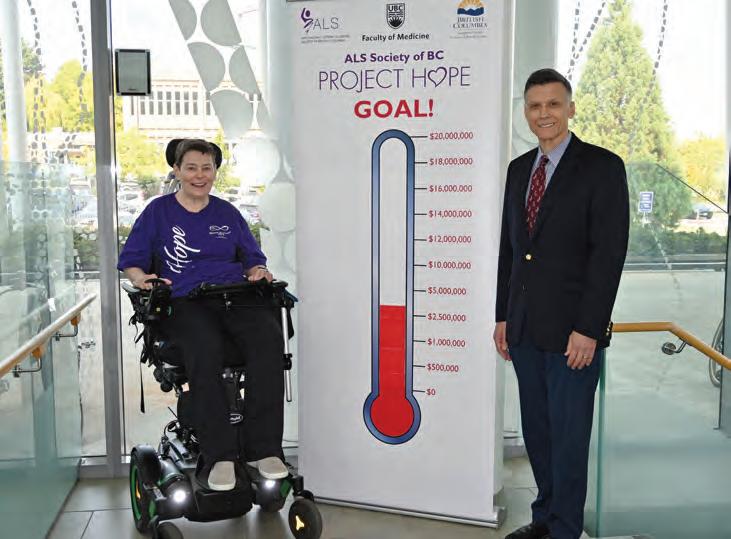
The Amyotrophic Lateral Sclerosis and Related Disorders (ALSRD) Clinic opened at the Djavad Mowafaghian Centre for Brain Health in June 2024, offering comprehensive care for patients with ALS and related motor neuron diseases (MNDs). The clinic joins six other clinics at the Centre, providing in-person and virtual consultations. Staffed by neuromuscular neurologists and an ALS care team, the clinic plans to expand to include a clinical/research nurse. In partnership with the ALS Society of BC, the clinic also operates a mobile outreach program for patients in remote areas.
The clinic is part of the overarching ALSRD Program, led by Dr. Erik Pioro, which focuses on clinical trials and research to identify biomarkers for ALS, aiming to improve diagnostics and therapies. A biobank and repository of clinical data will support this research. The clinic’s location within the Centre fosters collaboration with researchers studying
related conditions, enhancing the translational research process. This initiative is part of PROJECT HOPE, established by the ALS Society of BC, with the goal of creating a world-class ALS Centre at UBC and ultimately eradicating ALS.
Dr. Erik Pioro joined the Centre as the ALS Society of BC Professor of ALS Research at UBC in March 2024, bringing decades of experience in ALS care and research, including over 20 years at the Cleveland Clinic. His leadership is expected to accelerate the development of treatments and strengthen translational research in ALS and other neurodegenerative diseases.
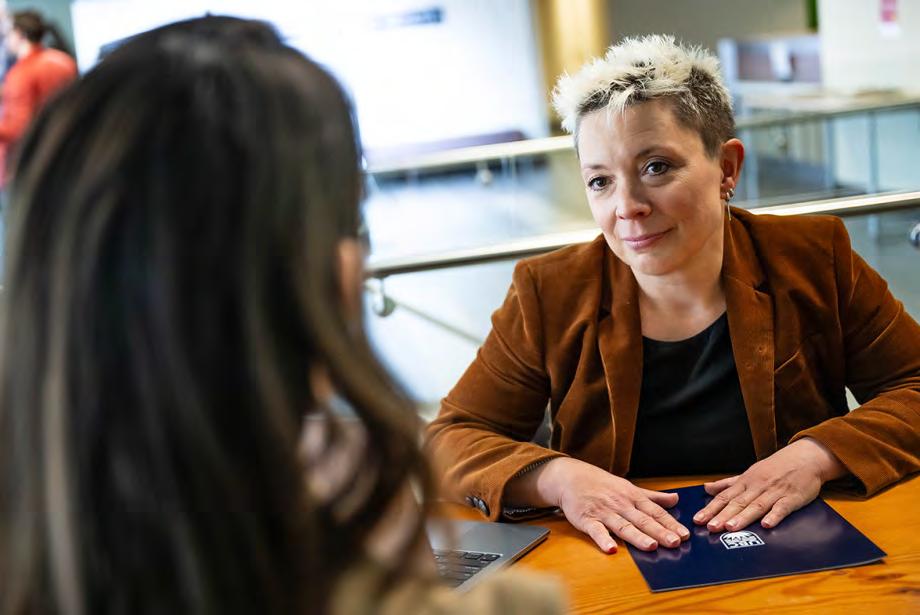
“
The genetic insights provided by pharmacogenomic testing can help physicians make more informed treatment decisions and reduce the lengthy trial-and-error process that many patients experience in finding an effective medication.”
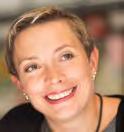
A study led by Dr. Jehannine Austin reveals that pharmacogenomic testing, a genetic test to determine the best antidepressant for patients with moderate-to-severe depression, could save British Columbia’s public health system an estimated $956 million over 20 years and significantly improve patient outcomes. Published in the Canadian Medical Association Journal, the research shows that this testing, which matches medications to patients based on their genetic profiles, could lead to increased remission rates and better quality of life, reducing hospitalizations and intensive treatments.
Depression affects one in 10 Canadians, but over half of patients don’t respond to their initial antidepressant, and 27 per cent experience adverse effects. Genetic factors
account for up to 42 per cent of this variation. Pharmacogenomic testing uses genetic information from cheek swabs, blood or saliva to guide medication selection, reducing the trial-and-error process in treatment. The study’s simulation model, based on data from 194,149 adults over 20 years, predicted 37 per cent fewer patients with treatment-resistant depression and 15 per cent spending more time without symptoms, potentially preventing 1,869 deaths and 21,346 hospital admissions.
Pharmacogenomic tests are currently not publicly funded. Dr. Austin and her team are looking at different implementation strategies to determine what will best support patients and work for healthcare providers, while being cost-effective and feasible to bring into practice in BC.

Despite decades of neuroimaging research, the global scientific community has not yet established normative ranges for the size of human brain regions, crucial for accurate diagnosis and risk assessment in neuropsychiatric conditions. Unlike other fields where normative values are welldefined, such as IQ in psychology or blood sugar levels in medicine, brain imaging lacks standardized reference points for brain region sizes, such as hippocampal volume, based on sex and age. This gap has led to reliance on case-control designs in brain abnormality assessments, which often suffer from limited sample size and diversity.

“Our empirically benchmarked framework, available through CentileBrain.org, represents a major milestone in personalized brain structure, function and brainage measures. This platform will standardize brain imaging analysis, benefiting researchers and clinicians alike, ultimately aiming to enhance patient care and outcomes.”
Dr. Frangou
The CentileBrain initiative, published in Lancet Digital Health, addresses this challenge by providing normative data on brain region sizes from over 37,000 healthy individuals aged three to 90 years globally. Led by UBC President’s Excellence Chair in Brain Health, Dr. Sophia Frangou, along with researchers from the Icahn School of Medicine at Mount Sinai and the ENIGMA Lifespan Working Group, this project marks a significant advancement in brain imaging. Using normative modeling, an advanced statistical method, the researchers created robust lifetime charts of regional brain volumes, enabling the detection of deviations in brain structure associated with neuropsychiatric disorders.
“Normative modeling holds unprecedented potential for understanding brain alterations in neuropsychiatric disorders,” says Dr. Ruiyang Ge, lead author of the study. “Yet, the models’ robustness requires rigorous empirical investigation, motivating our comprehensive examination.”

GIULIA COCCO, MSC STUDENT
Giulia Cocco, a first-year Master’s student in neuroscience under Dr. Jason Snyder, is exploring the role of the hippocampus in anxietylike behaviour in mice and developing a contextual fear conditioning paradigm to study the long-term effects of early life stress. Initially focused on spatial encoding, Giulia is now delving into the emotional aspects of memory, comparing her research journey to exploring the “dark side of the moon.” She is also passionate about the role of the immune system in the central nervous system, particularly its potential link to neurodegenerative diseases.
Giulia decided to pursue neuroscience because she felt its multidisciplinary nature offered the most wellrounded education. With a BSc in Neuroscience and Psychology from the University of Lethbridge, she has extensive research experience, but so far finds graduate school more challenging and engaging. In her lab, they use transgenic animals and viral tools to investigate how hippocampal neurogenesis influences memory, decision-making and stress-related behaviours across the lifespan.
“
Curiosity has driven my entire career. Each project I complete leaves me with more questions than I started with. It’s a self-sustaining system where the boundaries of my curiosity expand as I gain more knowledge.”


Akosua Kesewah Asare is a PhD candidate in neuroscience, working under Dr. Deborah Giaschi at BC Children’s Hospital’s Visual Neuroscience Lab. Her research focuses on understanding how developmental visual disorders like amblyopia (lazy eye) impact motion and depth perception. She uses psychophysics and functional MRI to study these neural processes. Her curiosity about conditions like lazy eye, sparked during optometry school, led her to pursue a graduate degree in neuroscience.
A typical day for her as a graduate student varies by season because her work mostly involves school-aged children. In the summer or during spring break, Akosua is usually busy with setting up and running psychophysical and functional MRI experiments. Otherwise, her days are spent working on the data collected, writing proposals, preparing talks and posters, as well as mentoring other undergraduate research assistants in the lab.
Her ideal career goal is one where she can combine her research and clinical skills. Akosua advises students interested in graduate school to gain experience through volunteer roles or research assistantships and to explore topics that intrigue them.
“
Even though we are working towards becoming experts in very niche areas, the variety of skills we gain during our training as graduate students which can be applied in many other different areas is interesting.”
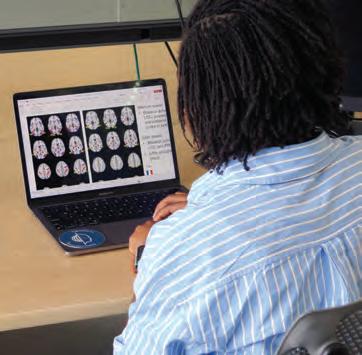

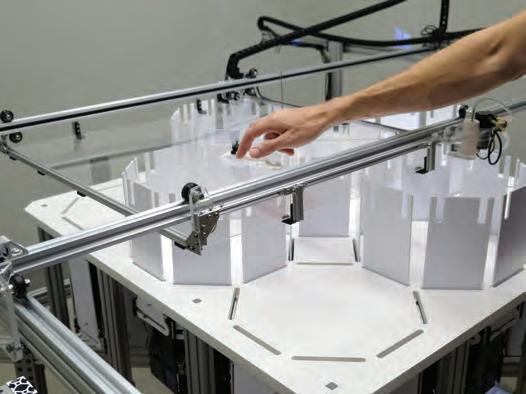

Dr. Adam Lester, a postdoctoral fellow in Dr. Manu Madhav’s lab, enjoys integrating design and neuroscience, transforming concepts into practical research tools. Originally focused on art, theatre and philosophy, he later developed an interest in the philosophy of mind and science, driving him to explore beyond theoretical limits and into empirical research. At the University of Arizona, he worked in Dr. Carol Barnes’ lab, focusing on aging and spatial navigation, leading to his development of the Instantaneous Cue Rotation apparatus, which uses projected visuals to alter navigational cues with minimal interference.
Over the past three years in the Madhav lab, Adam designed the Omniroute Maze, an automated, versatile maze that allows for diverse spatial navigation experiments. The maze features retractable walls, projectors, speakers and an automated reward system, which eliminates the need for human intervention. The lab is finalizing a methods paper with open-source instructions to help other researchers replicate the maze and adapt it for their own studies.
With his passion for combining design and neuroscience, Adam is considering a range of future possibilities, including pursuing a role as a principal investigator or exploring industry positions.
“
I’d say a lot of my work has really been more enjoying that creative side of building. I love designing things. I love having them in my head, and then having them physically implemented in the world. Going from a sketch to a CAD model to fabrication, assembly, testing and implementation is deeply satisfying.”
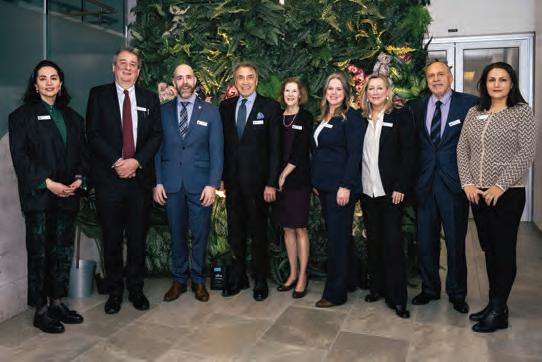
“
On February 8, 2024, donors and friends of the Djavad Mowafaghian Centre for Brain Health gathered to celebrate a decade of excellence in research, education and patient care since the official opening of the building in 2014. The generosity of the Djavad Mowafaghian Foundation has catalyzed all the achievements of the Centre and inspired a community of donors who support many aspects of the Centre’s work.
“I’d like to express my heartfelt appreciation to the Djavad Mowafaghian Foundation and the late Dr. Mowafaghian— thank you so much for putting your trust in UBC more than a decade ago,” said Dr. Benoit-Antoine Bacon, UBC President and Vice-Chancellor. “The ripple effect of your investment in this state-of-the-art facility is felt throughout BC, across the country, and beyond.”
“The wonderful thing about the Centre is that it works as a hub that integrates multiple disciplines. It brings together experts and learners from different fields and connects them with patients, families and communities,” said Dr. Dermot Kelleher, Dean of the Faculty of Medicine and Vice-President, Health. “This has served as a blueprint
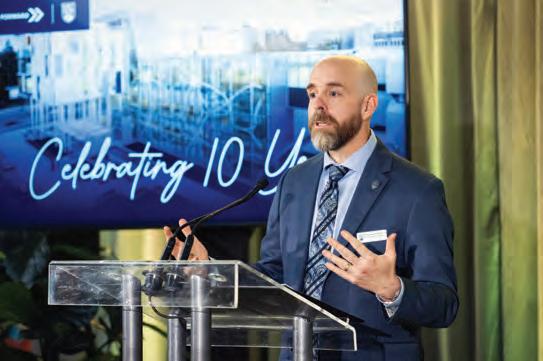
This is so much more than a building—this is a home where a community of foundational and clinical research teams collaborate and work together toward the ultimate goal of advancing brain health across the life course.” — Dr. Bacon
for interdisciplinary team science across the Faculty of Medicine that is integral to our vision to transform health for everyone.”
“Over the past decade, we have built an internationally recognized program of research that has provided me with the opportunity to nurture a rewarding career as a research scientist here at UBC,” said research associate Dr. Sophie Stukas, who was just completing her PhD under the supervision of Dr. Cheryl Wellington when the Centre first opened. “Our success has not been in isolation. The Centre provides much more than just four walls to work within—it provides a space where clinical and basic science come together, allowing creativity and synergy to thrive. As basic scientists, we depend on our clinical colleagues to interface with patients and ensure our research addresses the most urgent needs.”
The Indigenous Undergraduate Student Summer Internship Program, led by Dr. Kurt Haas, was established in 2019 through funding from the International Brain Research Organization (IBRO) to support three students to work in neuroscience research labs at UBC. Aiming to address the underrepresentation of Indigenous trainees and scientists, the program expanded in 2022 by partnering with the Djavad Mowafaghian Centre for Brain Health, growing to five undergraduate internships. The program’s success led to further expansion in 2023, with additional funding from both IBRO and the Centre, for seven students. More importantly, the program expanded to other Canadian universities, including UBC Okanagan, University of Victoria and University of Lethbridge.
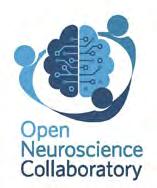
With the Djavad Mowafaghian Centre for Brain Health joining The Neuro as an Open Science Institute in 2023, we have created the UBC Open Neuroscience Collaboratory to support the Centre’s adopted open science principles and provide open science support to our members. This includes the recently launched Collaboratory website and its resources page where we have begun to collect and expose the enormous wealth of know-how that supports the Centre’s science. Often this information is buried in the methods sections of journal articles and not always accessible outside the university setting.
Working together with Margot Gunning, a Juris Doctor student from the UBC Peter A. Allard School of Law, the Collaboratory also hosted a series of sessions on the intersection of Open Science and Intellectual Property aimed at early career researchers with a focus on maintaining the researcher’s intent throughout the process of research and research dissemination. These sessions provided participants with the background legal context for Intellectual Property in Canadian law, as well as the relevant UBC Policy.
In addition to gaining work experience in the lab, the program provides mentorship and tutorials on developing critical thinking skills and critiquing scientific literature, as well as on fundamentals and techniques in neuroscience. Community building is central to this experience, with structured journal clubs and discussions between participating trainees, and opportunities for their interaction with and mentorship of K-12 Indigenous students. Since its inception, 17 Indigenous undergraduates have participated, with five funded by the Centre.
The 2023 cohort of students included Chloe Drosch (UBC), Juliet Webster (UBC), Deserae Tailfeathers (University of Lethbridge), Erin Clouthier (University of Victoria), K’sana Wood Lynes-Ford (University of Victoria), Lauren Faulkner (University of Victoria) and Noah Kaiser (UBCO).
Over 100 faculty members and trainees attended the Centre’s 2024 Research Retreat held from June 12-14 at UBC Okanagan. With a diverse range of speakers from each of the five Integrated Research Programs, the retreat was a great opportunity to learn more about the research being done at the Centre while also building new connections and fostering team building outside of the lab. Thanks to the speakers who gave talks and trainees who presented posters. Congratulations to Adam Lester (Madhav lab), recipient of the “Best Trainee Talk” prize, and Rocio Hollman (Bamji lab) and Bradi Lorenz (van Donkelaar lab), who won the “Best Speed Poster Presentation” prize.


This past spring, UBC hosted the 16th Annual Vancouver Brain Bee, where 42 high school students from grades 9 to 12 competed in a neuroscience knowledge competition at the Djavad Mowafaghian Centre for Brain Health. The Brain Bee, a global event held in 30 countries, challenges students on topics like memory, intelligence, emotion and neurodegenerative diseases. The event featured an opening presentation by Dr. Shernaz Bamji, lab tours, interactive demos and networking opportunities.
Irene Zhang, who was the first-place winner, described the competition as intense but rewarding. In particular, she enjoyed exploring various post-secondary career paths and touring an active research facility. She went on to compete in the National Brain Bee, which Dr. Claudia Krebs helped her prepare for with a neuroanatomy demo.
Irene’s interest in neuroscience was sparked by her background in dance and a virtual program last summer. She is especially passionate about neurodegenerative diseases, neuroplasticity and neuro-oncology, and hopes to pursue a career in research.
“
Throughout this entire experience, something I really loved was all the connections I was able to make,” says Irene. “From like-minded peers to distinguished professors and UBC students, everyone was so welcoming and supportive, and it was amazing to engage with so many perspectives.”
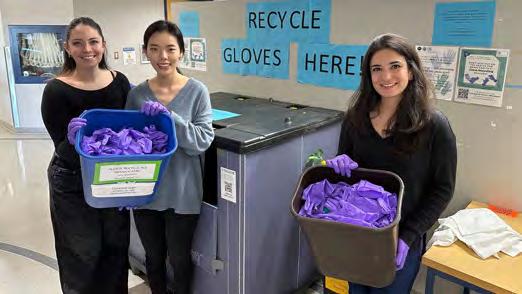
The Djavad Mowafaghian Centre for Brain Health continues to be a sustainability leader at UBC through its Glove Recycling Program. Recently, the Centre shipped off two more pallets of disposable gloves for recycling— weighing 584 kilograms, which is approximately 195,000 gloves! These gloves were collected over the last 18 months from all participating labs at the Centre and will be turned into new plastic products such as lawn furniture.
The initiative has been spearheaded by members in Dr. Kiran Soma’s lab – Melody Salehzadeh (PhD graduate), Michelle Jung (PhD candidate), Brittany Docolas (MSc student), Anna Mazurenko (Research Assistant) and Bella Yang, Emma Lam and Alexanne Hall (Undergraduate Research Assistants).
“Through this initiative, we hope to spark conversations around waste reduction in labs and motivate the recycling of new materials,” says Melody.
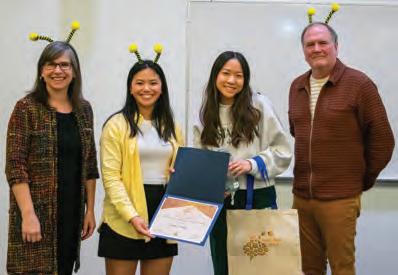
Since starting the glove recycling initiative in October 2021, the Centre has collected over 730 kilograms of disposable gloves, which equates to approximately 245,000 gloves that have been diverted from the landfill. In an exciting new development, the team of students helping run the Centre’s Glove Recycling Program recently received an award through the UBC Student Environment Centre to fund lab plastic recycling for unmarked plastics such as pipette tips, falcon tubes and petri dishes. Stay tuned for more details!
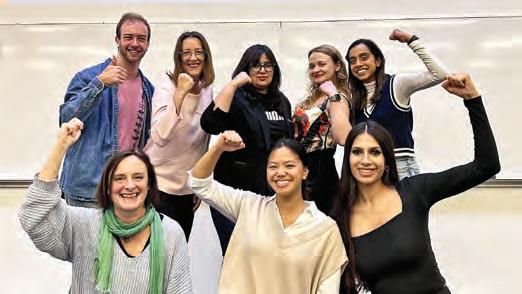

The Centre’s trainees have been actively involved with Support Our Science (SoS), a grassroots organization with the mission of improving pay for graduate students and postdoctoral scholars in Canada. Federal funding has not changed since 2003, while the number of graduate students and postdocs has doubled. SoS has been advocating for an increase in the value and number of Tri-Agency graduate and postdoctoral scholarships, and to index all scholarships and fellowships to inflation going forward.
Some of the initiatives spearheaded by the Centre’s trainees and UBC’s Neuroscience Trainee Association (NTA) over the last year include organizing a national walkout, calls and petitions to MPs and hosting a town hall and panel to highlight the goals and mission of SoS, while sharing concerns and experiences of graduate students and postdocs.
These actions proved to be effective, as the Government of Canada’s Federal Budget 2024 announcement promised more funding for basic research and trainee stipends (including increasing the annual value and number of graduate and postdoctoral fellowship scholarships), with a specific focus on supporting brain research. This is an important step towards boosting scientific research and attracting the next generation of researchers in Canada.
The Centre supports its trainees in continuing to advocate for more funding in basic science, so that it can continue to advance brain health through research, education and patient care.
UBC’s Office of the Vice-President, Research and Innovation announced 45 research excellence clusters that will be supported with funding in 2024-25 through the Grants for Catalyzing Research Clusters competition. Three of these Research Excellence Clusters are led by our researchers.
DYNAMIC BRAIN CIRCUITS IN HEALTH AND DISEASE RESEARCH EXCELLENCE CLUSTER

Led by Dr. Timothy Murphy, the Dynamic Brain Circuits in Health and Disease cluster brings together diverse scientists and accelerates their insights into brain circuit function by creating a stronger, more equitable and inclusive research environment: access for all to infrastructure, technology and training that embraces modern data-driven methodologies. The cluster provides essential standards and training necessary to develop next generation treatments for brain disorders.
COLLABORATIVE ENTITY FOR CEREBROVASCULAR ISCHEMIA (CEREBRI)
Led by Dr. Mypinder Sekhon, the Collaborative Entity for ceREBrovasculaR Ischemia (CEREBRI) is an emerging cluster comprised of multidisciplinary health professionals, clinician-scientists, health policymakers, neuroscientists, UBC academic Faculty of Medicine Departments / Divisions, as well as patient and family partners who are collectively focused on improving the clinical outcomes of British Columbians with diseases emanating from cerebral ischemia.
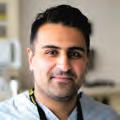

Led by Dr. Anthony Phillips, MATRIX-N seeks to bridge gaps between neuroscience/psychiatry research, clinical practice and patient needs to facilitate innovative solutions to local/global challenges related to the overdose crisis, high-risk substance use, concurrent disorders and pain. Two promising strategies to address research gaps are the integration of foundational and clinical research, and the concept of ‘reverse translation,’ which prioritizes insights from clinicians, front-line health workers and patients in inspiring translational research with potential for immediate and significant clinical impact.
On October 19, 2024, the BC Brain Wellness Program (BCBWP) proudly marks its 5th anniversary. To celebrate this milestone, we are bringing together the vibrant community that built this impactful and inspiring program through a hybrid event, both in-person and online.
Since its launch, the BCBWP has been driven by a commitment to support the over one million British Columbians living with chronic brain conditions. In a healthcare environment often lacking adequate programs for long-term wellbeing, the BCBWP stands as a valuable and necessary resource. Here’s how we contribute to the solution:
The Challenge: Chronic brain conditions often come with a range of challenges, including physical disabilities, depression, anxiety, apathy, social isolation, cognitive impairment and financial stress.
Our Approach: We offer lifestyle interventions designed to enhance overall wellbeing, addressing these challenges and improving quality of life for participants.
The Challenge : Exercise, healthy nutrition, stress reduction, social connectedness and creative and cognitive activities are key to brain health. Many wellbeing programs, if available, are hindered by barriers like limited availability, high costs and a lack of support for care partners.
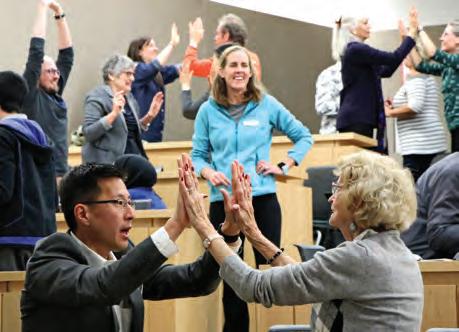
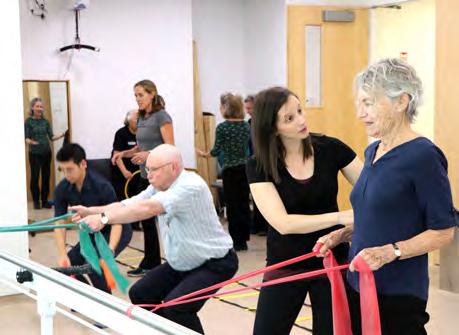
The Challenge: As conditions progress and risks increase with age, the demands on the healthcare system continue to grow.
Our Approach: We provide free, holistic, non-condition-specific programs that are accessible to participants including care partners throughout BC, with no referrals required.
Since its inception, the BC Brain Wellness Program has seen remarkable growth and continues to serve as a key resource for our community. Highlights include:

Our Approach: By offering continuous and complementary care that supports both prevention and treatment, we help reduce strain on the provincial healthcare system.
Our goal for the upcoming year is to secure long-term partnerships, allowing for the continuation, expansion and increased access of the program.
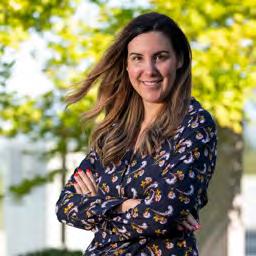
An Associate Professor in the Department of Psychology, Dr. Daniela Palombo’s research focuses on cognitive and neural factors associated with how we form and retain autobiographical memories and how this differs across individuals. She is particularly interested in exploring how we use our memories to create meaning in our lives, including how our memories shape our self-perception.
Her latest project will investigate how fertility-related experiences affect memory, self, schema and wellbeing, highlighting the intersection of memory and personal identity. Recently, she also published a collaborative research paper with Dr. Brendan Gaesser’s lab from the University at Albany SUNY on “collaborative imagination,” exploring how imagining shared futures can strengthen relationships and foster a sense of social connection.

Carolyn is a Nuclear Medicine/MRI technologist and the Head PET/ MRI Technologist in the Charles E. Fipke Integrated Neuroimaging Suite. Beginning her career with the UBC PET program in 1994, she has witnessed significant technological advancements in PET scanning, having worked on five different PET scanners.
Beyond research, Dr. Palombo is also dedicated to mentorship and education. She founded the fMRI Brain Camp at UBC to provide hands-on neuroimaging training and foster an open learning environment. By creating an open and welcoming space, she hopes to empower trainees (and even faculty) with the tools to expand their knowledge.
Inspired by her mentor, Dr. Rebecca Todd, she emphasizes authenticity in mentoring, sharing both successes and challenges with her students. Through her approach, Dr. Palombo not only helps her students develop technical skills but also prepares them to navigate the challenges of a research career with resilience and collaboration.
When you think about the question, ‘Who am I?’ We often draw on our autobiographical memories to find the answer. But our identity is also shaped by societal norms—it is through that lens that we encode and remember our life experiences.
Her role involves scanning research volunteers for various studies, which have expanded from Parkinson disease to include Alzheimer’s, dementia, psychiatric disorders, COVID-19 and aging.
Carolyn enjoys the evolving nature of research and values the opportunity to meet diverse participants. A lifelong learner, she recently earned her MRI certification and advises embracing challenges as learning opportunities.
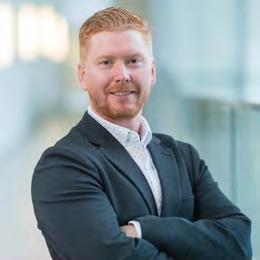
Dr. Stefan Lang, a neurosurgeon and Clinical Assistant Professor, is interested in using neuroimaging and brain stimulation to understand and treat neural network diseases. In particular, his research focuses on optimizing deep brain stimulation (DBS), a technique involving the implantation of electrodes deep within the brain to treat dysfunctional circuits, for movement disorders such as Parkinson disease. While DBS effectively manages motor symptoms in Parkinson’s, its impact on emotional and cognitive issues, known as nonmotor symptoms, varies.
His latest research study focuses on improving DBS’s effectiveness for non-motor symptoms using advanced neuroimaging to understand how electrode placement influences brain networks. This will help optimize
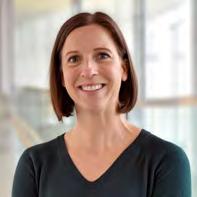
Katherine is the Research Grants Facilitator for the Djavad Mowafaghian Centre for Brain Health. She is a key resource for information for funding opportunities, matching researchers with relevant grants and potential collaborators, and assists in the development, writing and polishing of
treatment and offer new hope for both physical and cognitive challenges faced by Parkinson disease patients.
Dr. Lang is also exploring DBS for Alzheimer’s and other neurodegenerative diseases, and studying intracranial neurophysiology and non-invasive brain stimulation techniques. Since new DBS devices are approved to be safely used in 3T MRI machines, Dr. Lang and his team are hoping to take advantage of this in future research studies by performing simultaneous DBS and functional magnetic resonance imaging (fMRI).
I was drawn to neurosurgery—specifically functional neurosurgery—which is an established, but rapidly evolving surgical specialty that lies at the intersection of neurosurgery, neurology and psychiatry. In this capacity, I have the immense privilege of directly helping patients on a day-to-day basis, with surgeries such as DBS, while also having the unique opportunity to study the human brain along the way.
competitive grant applications. She also supports the Centre’s five Integrated Research Programs in their activities, including applications for team grants.
Katherine has an extensive background in both neuroscience research and clinical practice, with an MA in Cognitive Psychology from Michigan State University and an MS in Speech and Language Pathology from Vanderbilt University.
The NINC continues to be an important resource for the Djavad Mowafaghian Centre for Brain Health community, with 23 member labs and 285 individual researchers, totalling 60,000 hours of usage over the past two calendar years— which is an average of 82 hours per day every day for two years! Databinge also has 506 users in its Slack workspace with 2,000+ messages sent per month, providing an online forum for sharing knowledge about computational methods and applications.
The acquisitions for NINC’s iMAP (in vivo Mesoscale Assessment of the neuroProjectome) project are nearly complete. The 3-photon microscope is expected to be complete in early 2025 and NINC’s functional ultrasound imaging (fUSI) system was recently installed, tested and validated. fUSI provides MRI-like brain imaging in animal models of human disease but with higher resolution and the potential to assess cerebral blood flow throughout the brain.
In addition to its ongoing Databinge sessions, NINC also hosted several events for the neuroscience community:
UBC TISSUE CLEARING AND EXPANSION 2024 :
NINC, together with the Brain Circuits cluster and sponsored by LifeCanvas Technologies, hosted its fourth event on Tissue Clearing and Expansion, building on past events in 2017, 2019 and 2021. With a strong local community, these important 3D spatial biology techniques that link structure and function brain-wide are now well-established at UBC.
HANDS-ON, NEURAL, BEHAVIOURAL AND HISTOLOGICAL DATA ANALYSIS WORKSHOP:
NINC, together with the Brain Circuits cluster, hosted a Data Analysis workshop as a Satellite to the 17th Canadian Neuroscience Meeting. Current neuroscience research seeks to link brain activity and circuit structure to behaviour, relying on sophisticated experimental techniques that generate large data sets. While opensource software is available to work with this data, it often has a steep learning curve. This workshop provided participants with hands-on experience using three major open-source software packages, offering fully worked examples and guidance from the NINC team.
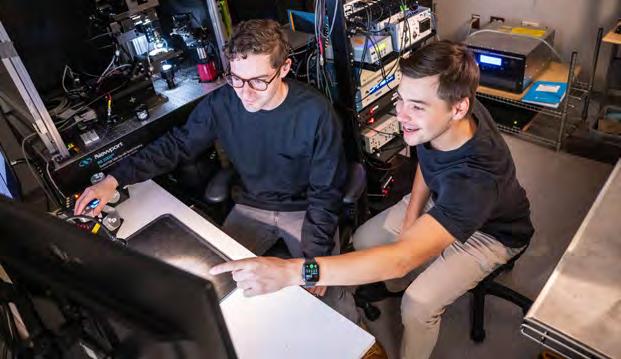
NINC recruited Dr. Federico Bolaños to serve as lead Data Scientist for the iMAP project and support NINC and the Centre’s members with his 10 years of experience in neuroscience research. His skills span hardware, software and data analysis.
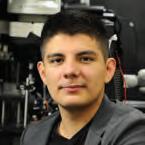
Dr. Bolaños, a former UBC student, graduated in May 2023 with a PhD from the University of Tokyo where he studied the mouse visual system using widefield and 2-photon microscopy. Most recently, he was awarded an OpenScope project from the Allen Institute to study how the brain distinguishes textures from the world around us.
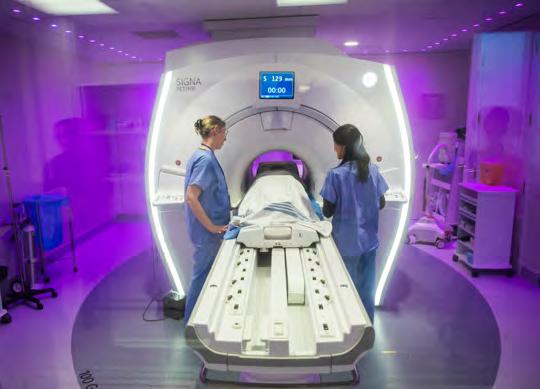

In January 2024, the GE Signa PET/MRI scanner at UBC was upgraded with new technology that improves image quality, accuracy and comfort for patients. The scanner now uses advanced head coils that provide sharper and more detailed brain images, and new digital channels have increased from 32 to 128, allowing for much higher resolution and greater imaging precision. A deep-learning algorithm also improves the clarity of images by reducing noise and new Motion Free Brain Technology now ensures better brain scans without adding extra scan time or requiring extra tracking equipment.
In February, the UBC MRI Research facility received groundbreaking upgrades to its 3T Philips Ingenia Elition MRI scanner, becoming the first MR7700 model in Canada. This new system offers clearer views of the brain’s neural pathways and with a new multi-nuclear spectrometer, can now scan beyond hydrogen in water molecules (“proton” MRI). It can also image different elements like phosphorus, to study cell energy dynamics, and sodium, to assess cell health which could help detect inflammation and degeneration in the brain. These new features open up exciting possibilities for research in different areas of the body. Over the past year, UBC MRI Research has performed over 1,000 scans, including its first heart study.
The Electrophysiology Suite, operational since 2021, continues to support research on stroke, Parkinson disease, brain development and healthy aging. In addition to housing advanced brain stimulators, it also contains an electroencephalography (EEG) and a focused ultrasound unit. In the fall of 2024, a new MRI-compatible transcranial magnetic brain stimulation system will be added, allowing for more complex studies that combine different imaging techniques.

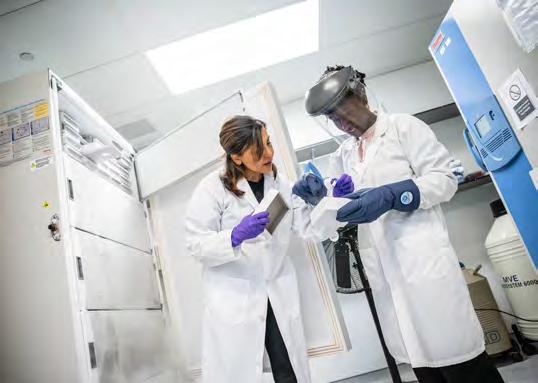
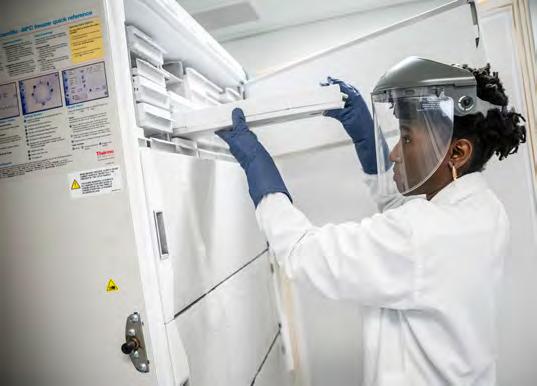
The Borgland Family Brain Tissue and DNA Bank (the Biobank) has made substantial progress in expanding its sample collection base and strengthening collaborations. The Biobank remains steadfast in its commitment to providing top-quality sample management services, encompassing every stage from participant consent to specimen collection, processing, storage and ultimately distribution for cutting-edge scientific research.
Over the past year, the Biobank has successfully collected close to 400 samples for its repository. As highlighted in last year’s report, the Biobank has now successfully migrated all data from the old database to OpenSpecimen, which is now fully operational, housing approximately 4,325 samples.
To further enrich its repository, the Biobank has extended its collaboration with the Clinic for Alzheimer Disease and Related Disorders and initiated a partnership with Dr. Erik Pioro in the ALS and Related Disorders Clinic. Currently, the Biobank is involved in seven active clinical trials, including the Hotel Study (TANDEM), which commenced earlier this year with the goal of recruiting approximately 500 participants. To date, 46 participants have been successfully enrolled.
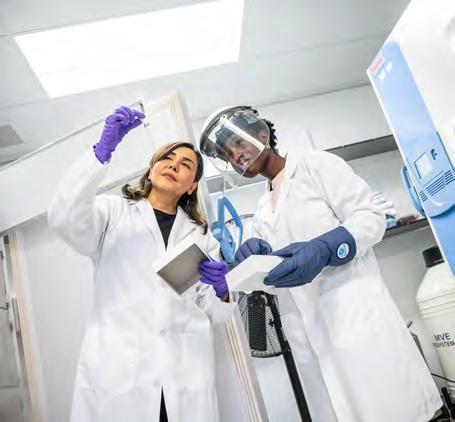
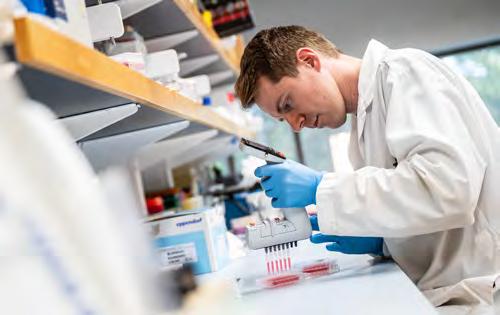
The Djavad Mowafaghian Centre for Brain Health Kickstart Grants are intended to encourage research that demonstrates new collaborations, directions, and technological developments. It supports new projects that generate preliminary data for future grant applications to external funding agencies. Four research teams received 2024 Kickstart Grants:
Deciphering the mechanism of divergent SETD2 neurodevelopmental disorders
Principal investigator: Dr. Carol Chen
Co-PI: Dr. Annie Ciernia

Effects of Psilocybin on Hippocampal Cognitive Map Stability and Plasticity
Principal investigator: Dr. Manu Madhav
Co-PI: Dr. Catharine Winstanley
Does Dopamine Encode Reward-Prediction Errors in Frontal Cortex?
Principal investigator: Dr. Jeremy Seamans
Co-PI: Dr. Anthony Phillips
Salience Network Plasticity in Female Youth with Depression Induced by Accelerated Theta Burst Stimulation
Principal investigator: Dr. Fidel Vila-Rodriguez
Co-PIs: Dr. Tamara Vanderwal, Dr. Roberto Sassi
The 2024 Djavad Mowafaghian Centre for Brain Health Trainee Endowment Awards recognize excellence in academics and research activities of our trainees. Special thanks to our donors and the Graduate Program in Neuroscience for their generous support.
Leslie Ann Wyman Brain Tumour Research Endowment: Warren Meyers, PhD student
Neural Repair (Spinal Cord) Endowment: Isa Samad, MSc student
GENERAL AWARD:
Tyrone Ly, MSc student
Shalini Iyer, PhD student
Tatiana MacKeigan, MSc Student
Margarita Kapustina, MSc Student
Ryan McCallum, PhD student
Peter Hogg, PhD student
Ninon Freidel, MSc student
Akosua Kesewah Asare, PhD student
Yeon Soo Seo, MSc Student
Julian Camillo Becerra Leon, MSc Student
Isabella Gallello, PhD Student
NORMAN CRISTALL RESEARCH ENDOWMENT:
Adam Sunavsky, PhD Student
Margot Gunning, PhD Student
Daemon Cline, PhD Student
John Ni, MSc Student
Christopher Lamb, MSc Student
The Djavad Mowafaghian Centre for Brain Health represents a partnership between Vancouver Coastal Health and the Faculty of Medicine at the University of British Columbia. The Centre was made possible with a generous donation from the Djavad Mowafaghian Foundation, as well as contributions from other philanthropists and leaders, in addition to those of the federal and provincial governments.

The University of British Columbia is a global centre for research and teaching, consistently ranked among the top public universities in the world. Since 1915, UBC’s entrepreneurial spirit has embraced innovation and challenged the status quo. UBC encourages its students, staff and faculty to challenge convention, lead discovery and explore new ways of learning. At UBC, bold thinking is given a place to develop into ideas that can change the world. www.ubc.ca

Vancouver Coastal Health (VCH) is responsible for the delivery of $4.1 billion in community, hospital and long-term care services to more than one million people in communities including Richmond, Vancouver, the North Shore, Sunshine Coast, Sea to Sky corridor, Powell River, Bella Bella and Bella Coola. VCH also provides specialized care and services for people throughout BC and is the province’s hub of health care education and research. www.vch.ca

Vancouver Coastal Health Research Institute (VCHRI) is the research body of the Vancouver Coastal Health and a world leader in translational health research. VCHRI is academically affiliated with UBC Faculty of Medicine and includes three of BC’s largest academic and teaching health sciences centres—Vancouver General Hospital, UBC Hospital and GF Strong Rehabilitation Centre—as well as other hospitals and public health agencies across Vancouver Coastal Health. As one of Canada’s top funded research institutes, VCHRI receives over $100 million in research funding annually to support health research and discoveries with direct health, economic and social impact on British Columbians. www.vchri.ca
